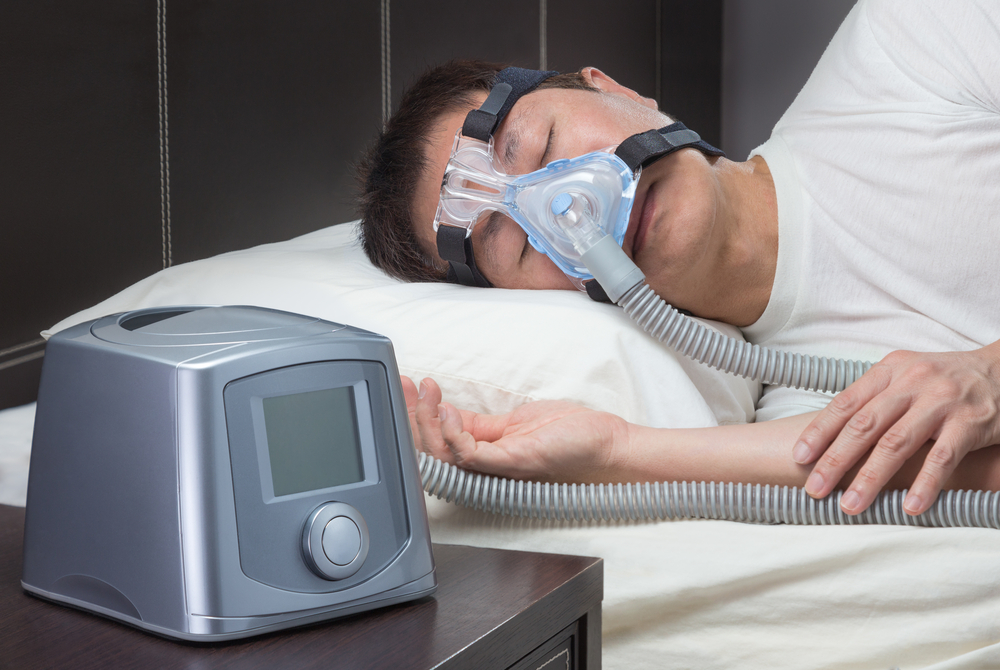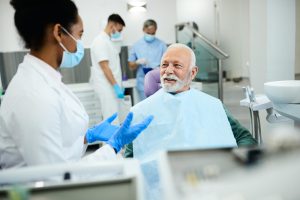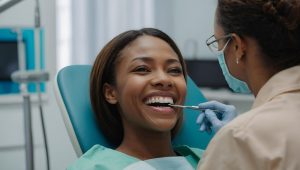A good night’s sleep can help you feel rested and healthy, but sleep apnea can cause many people not to get the sleep they need. Not sleeping well can lead to many health problems. Dental Care 4U will explain treatment options available for sleep apnea.
What Is Sleep Apnea?
Up to 10% of the world’s population suffers from sleep apnea. Sleep apnea is a common condition in which your breathing stops and starts multiple times during sleep. This prevents your body from getting enough oxygen. There are two types of sleep apnea.
1. Obstructive sleep apnea occurs when your upper airway becomes blocked multiple times during sleep, reducing or completely stopping airflow. This is the most common form of sleep apnea. Anything that can narrow the airways, such as obesity, enlarged tonsils, or changes in hormonal levels, increases the risk of obstructive sleep apnea.
2. Central sleep apnea occurs when your brain doesn’t send the signals it needs to breathe. Health conditions that affect how the brain controls the airways and chest muscles can lead to central sleep apnea.
Sleep apnea increases the risk of high blood pressure. It can increase the risk of heart attack and stroke, as well as heart rhythm disorders — especially if it’s severe enough and left untreated for a long time.
Signs and Symptoms Of Sleep Apnea
You will most likely not realize you have sleep apnea because the signs and symptoms happen while you are sleeping. Instead, your bed partner can point this out to you or some signs are still visible when you wake up. The most common signs and symptoms are:
- Snoring
- Tiredness or sleepiness during the day
- Restless sleep or frequent awakenings during the night
- Waking up with a dry mouth or sore throat
- Waking up suddenly after gasping or gagging
- Difficulty concentrating, forgetfulness, or paranoia
- Depression or anxiety
- Always need to pee at night
- Night sweat
- Sexual dysfunction
- Headache
Sleep Apaena Treatments
If your doctor determines that you have sleep apnea, they will recommend treatment based on the severity of your condition. In mild cases, you may only need to change your lifestyle. You may be asked to lose weight, quit smoking, or treat any potential nasal allergies.
If this does not work most sleep apnea experts recommend positive airway pressure, or CPAP, to prevent airway collapse. However, some people cannot use a CPAP machine all the time, and surgeries are often too invasive to prevent the problem.
If you have sleep apnea, oral devices can help. Oral appliances are custom-made devices that push the jaw and tongue forward and hold the tongue in place to open the airway during sleep. We offer a variety of oral sleep apnea device options, including:
- Mandibular Advancement Devices: These devices attach to the upper and lower teeth to advance the jaw and tongue, and can be adjusted to the patient’s teeth to reduce snoring and daytime sleepiness.
- Tongue Stabilizer: Tongue stabilizers use suction to pull the tongue forward, preventing it from blocking the airway.
- Rapid Maxillary Expander: A rapid maxillary expander is an orthodontic appliance that expands the upper jaw to open the airway. This involves wearing custom expanders that fit the upper molars and using pressure to correct the child’s arched palate.
At Dental Care 4U, we can give you better sleep and good oral health through quality dental care. Whether you need cleanings and examinations, crown replacements, or other treatments, we offer a range of services to meet all your basic dental needs. For more information, contact Dr. Raj Khurana by calling 708-333-2213 or visit our clinic in South Holland, IL.





